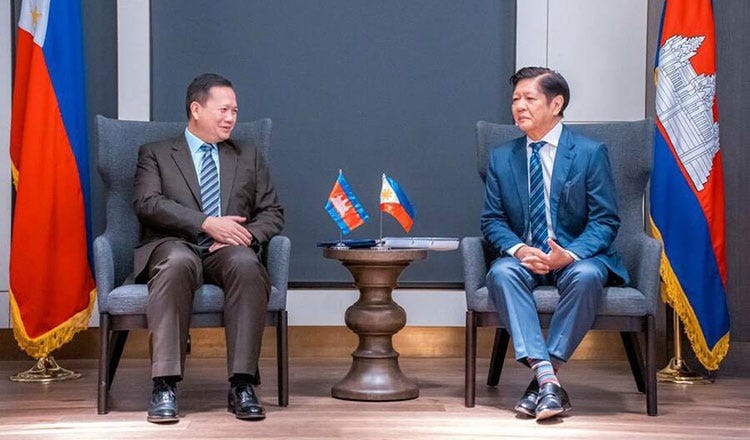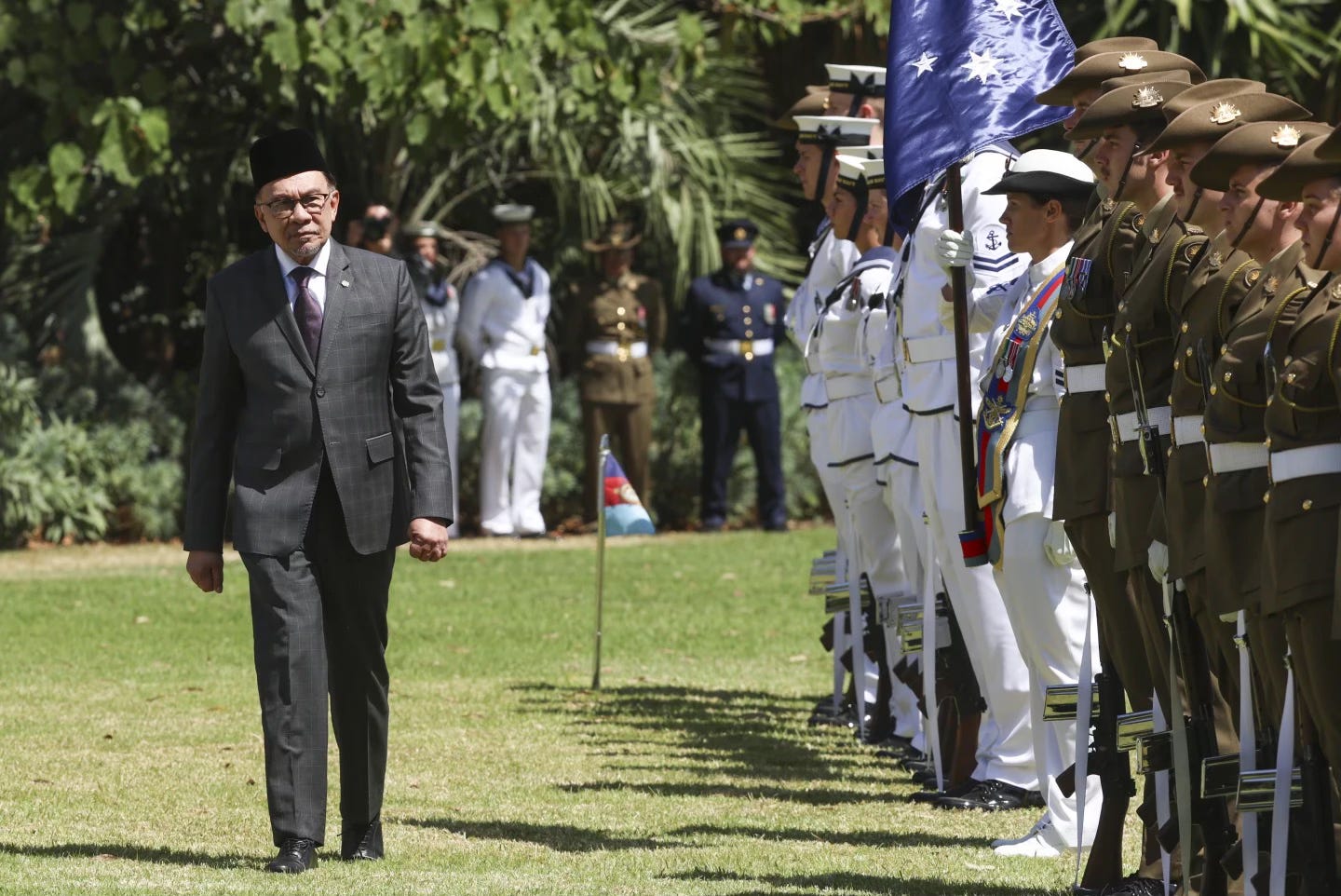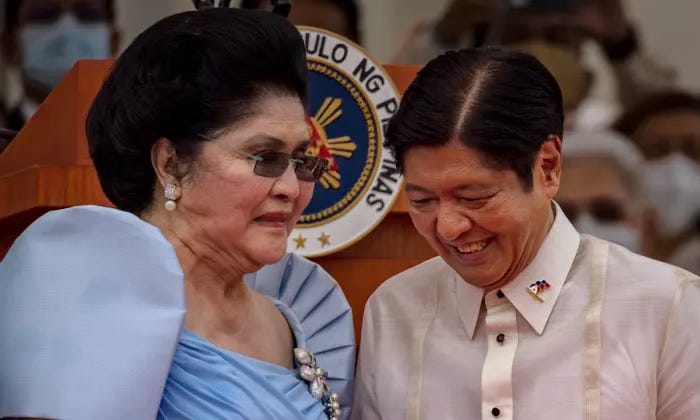Anwar Answers
Anwar “Why must I be tied to one interest? I don’t buy into this strong prejudice against China, this China-phobia.” Marcos "stand together more strongly against China." Hun Manet "Trade & Investment"
‘China remains a key ally’
By Lai Allison
MELBOURNE: As a “fiercely independent” nation, Malaysia will not be dictated to by anyone over its relations with China or any of its important neighbours, says Datuk Seri Anwar Ibrahim.
“While we remain an important friend to the United States, Europe and here in Australia, that should not preclude us from being friendly to one of our important neighbours, specifically China,” the Prime Minister said.
“We are fiercely independent. We do not want to be dictated to by any force.
“If they have problems with China, they should not impose them upon us. We do not have a problem with China,” Anwar said in a joint press conference with Australian Prime Minister Anthony Albanese during his official visit to the country yesterday.
Asked about how Sinophobia manifested itself and its effect on the region, Anwar replied that Malaysia upholds an “open trading policy to encourage investments from foreign countries.”
“They have levied some criticisms against us for giving additional focus to China. Right now, China seems to be the leading investor in Malaysia.
“Cumulatively, it’s still the United States of America,” he added.
On Feb 27, Anwar had decried “China-phobia” among US and Western allies in an interview with the Financial Times in the United States, questioning why Malaysia would “pick a quarrel” with China, its largest trading partner, in response to US criticism of Malaysia’s ties with Beijing.
“Why must I be tied to one interest? I don’t buy into this strong prejudice against China, this China-phobia.”
Calling China an important neighbour, he said Malaysia would give priority to enhancing relations with Beijing in terms of trade, investment and culture.
Anwar, who is in Australia with his wife Datuk Seri Dr Wan Azizah Wan Ismail and several ministers and leaders, will attend two major programmes – the Malaysia-Australia Annual Leaders’ Meeting and the Asean-Australia Special Summit.
Warm welcome: Anwar shaking hands with Albanese at Government House in Melbourne, Victoria. Looking on is Governor of Victoria, Margaret Gardener. — Bernama
On the Palestinian-Israeli conflict, Anwar lauded the Syrian government for supporting the call for a ceasefire and enhancing media efforts in Gaza.
“The consensus is in calling for a ceasefire and good humanitarian support, and probably avoiding the contentious issues between Palestine and Israel. At least for now, it is to cease fire and provide humanitarian assistance.”
Albanese also reiterated his call to end civilian suffering through a humanitarian ceasefire, the release of hostages, and a two-state political solution for Palestinians and Israelis to live with security and stability.
On the 10th anniversary of flight MH370, which went missing on March 8, 2014, Anwar said Malaysia would not hesitate to renew the search for the aircraft if there
was “compelling evidence.”
“We will be glad to reopen (the search) because I don’t think it’s a technical issue. It is an issue affecting the lives of people, and whatever needs to be done must be done,” he said.
Both Anwar and Albanese also agreed that Malaysia and Australia would like to achieve more growth in trade and economic relations, especially in green energy and education.
“There’s a real potential for further institutional investment from Australia into Malaysia as well, with universities and tertiary education being a real prospect.
“Australia remains an important supplier of LNG to Malaysia. We have so much in common in our economies that is quite complementary,” Albanese said.
He also said Australia was focused on this region despite receiving critical commentary about it sometimes.
“We make no apologies for our focus being on South-East Asia in the Indo-Pacific because this is where our future economic prosperity will be determined.
“We’re living in this region, the fastest-growing region of the world. What that presents is an enormous opportunity for both our nations,” he said.
Anwar replied that Malaysia was committed to facilitating all avenues that both countries could explore – including renewable energy, green technology, digitalisation, food security and education opportunities involving top Australian institutions.
Follow us on our official Substack for breaking news alerts and key updates!

Hun Manet and Marcos Jr. talk tax, defence, trade and tourism
Melbourne, Australia – Cambodia and the Philippines have agreed to strengthen defence ties to address mutual security concerns and boost the rice trade between the two nations.
The discussion was made during the bilateral meeting between Prime Minister Hun Manet and Philippines’s President Ferdinand R. Marcos Jr. on the sidelines of the ASEAN-Australia Special Summit in Melbourne yesterday.
The Special Summit is to celebrate 50 years since Australia became ASEAN’s first Dialogue Partner.
During the meeting the two leaders discussed a wide range of close bilateral issues, including defence, tourism, trade and double taxation, among other.
According to the Philippines’s Presidential Communications Office (PCO), during the meeting the leaders discussed the double taxation issue between the two countries.
“We are working very hard on the issue of double taxation between our two countries,” Marcos told Mr Hun Manet.
“And I just wanted to assure you that we are working on that… because if we are going to talk about increased trade between Cambodia and the Philippines, that has to be sorted out,” he added.
“But, I just wanted to assure you that we have gone through this process with other countries before, especially around Asia. And I’m pretty confident that we’ll find a good solution,” Marcos said.
In response, Mr Hun Manet stated that the Cambodian government will also address the issue, as Cambodia is actively pursuing similar initiatives with other countries to enhance trade and investment mechanisms.
The discussions on the double taxation agreement between the Philippines and Cambodia began in Manila in 2018, with continued efforts in subsequent years.
This agreement ensures that individuals or entities receiving income in one country won’t face double taxation in the other contracting state. It also offers tax relief through exemptions or preferential rates, aiming to curb tax evasion and promote foreign trade and investment between the two nations.
The leaders also discussed expanding flight connections to enhance accessibility to the countries’ premier tourism destinations.
Mr Hun Manet expressed his interest in further discussions on connectivity and increasing the number of tourists travelling between Cambodia and the Philippines.
Marcos informed Mr Hun Manet that the Philippine government has enlisted a group to modernise and enhance the efficiency of Manila airport.
Additionally, he mentioned the ongoing development of regional airports near tourist destinations to attract more travellers to the Philippines.
Marcos and Mr Hun Manet also agreed to bolster defence ties in order to address shared security concerns.
Mr Hun Manet and Marcos have previously met on the sidelines of the 43rd ASEAN Summit in Indonesia.
During that discussion, Marcos suggested the potential of sourcing rice from Cambodia and emphasised the importance of enhancing commercial aviation between the two nations.
Cambodian officials outlined their goal of capturing a one percent share of the imported rice market in the Philippines by 2024. They urged stakeholders to maintain and intensify efforts to boost rice exports to the Philippines.
Read more here.
Marcos: like father like son
“Stand together more strongly against China”
MELBOURNE, Australia (AP) — Philippine President Ferdinand Marcos Jr. said Monday that he had no choice but to defend his country’s territory in the South China Seaagainst what he called Chinese aggression and illegal actions in pursuit of Beijing’s own territorial claims.
“It is unfortunate that despite the clarity provided by international law, provocative, unilateral and illegal actions continue to infringe upon our sovereignty, our sovereign rights and jurisdictions,” Marcos told the Lowy Institute international policy think tank in the Australian city of Melbourne.
China claims sovereignty over virtually the entire South China Sea, which is one of the world’s most crucial waterways for shipping. That has put it at odds with the Philippines, Vietnam, Malaysia, Taiwan and Brunei, which all maintain claims to islands, reefs and undersea resources in the region.
Marcos, who is attending a summit of the Association of Southeast Asian Nations in Melbourne, said standing up to China in the South China Sea was not a policy choice.
“We simply have no choice. We must defend the territory of the republic. That is a primordial duty of a leader,” Marcos said. “The territorial integrity of the Philippines cannot be threatened, and if threats are made, then we must defend against those threats.”
Chinese Foreign Ministry spokesperson Mao Ning accused the Philippines of taking provocative action in the South China Sea and undermining China’s territorial sovereignty and maritime interests.
“China has taken necessary measures in accordance with the laws to safeguard its sovereignty and interests,” she said. “There is no so-called Chinese harassment of the Philippine ships.”
Earlier on Monday, Philippine Foreign Minister Enrique Manalo urged regional neighbors to stand together more strongly in upholding the rule of law in the South China Sea, where China has constructed garrisons on several artificial islands in a bid to fortify its claims.
The Philippines has accused China of deploying coast guard ships and civilian vesselsto block fishermen’s access to reefs and corals and prevent resupply of its troops.
Both Marcos and Manalo referred to the Philippines’ legal victory over China in a 2016 arbitration ruling in The Hague, Netherlands, that invalidated Beijing’s vast territorial claims in the South China Sea. China did not accept the ruling.
“The shared stewardship of the seas and oceans in the region behooves us to unite in preserving the primacy of international law so we can ensure equitable and sustainable outcomes for all,” Manalo said. “It also calls for us to stand firmly together in opposing actions that contradict or are inconsistent with international law.”
Australian Foreign Minister Penny Wong echoed Manalo’s comments, saying the nine ASEAN member states represented at the Melbourne summit need to “nurture and protect agreed rules, uphold international law, prevent conflict and build strategic trust.”
“We know that a major conflict in our region would be devastating to our communities and economies, as the terrible conflicts in Gaza and Ukraine have shown,“ she added.
She announced that Australia would spend 40 million Australian dollars ($26 million) on enhancing its maritime partnerships in the region aimed at both security and prosperity.
Australia and the Philippines, conducted joint sea and air patrols in the South China Sea for the first time in November.
Chinese Foreign Minister Wang Yi told Manalo in December that China will maintain military pressure on the Philippines in the South China Sea.
Read more here.





